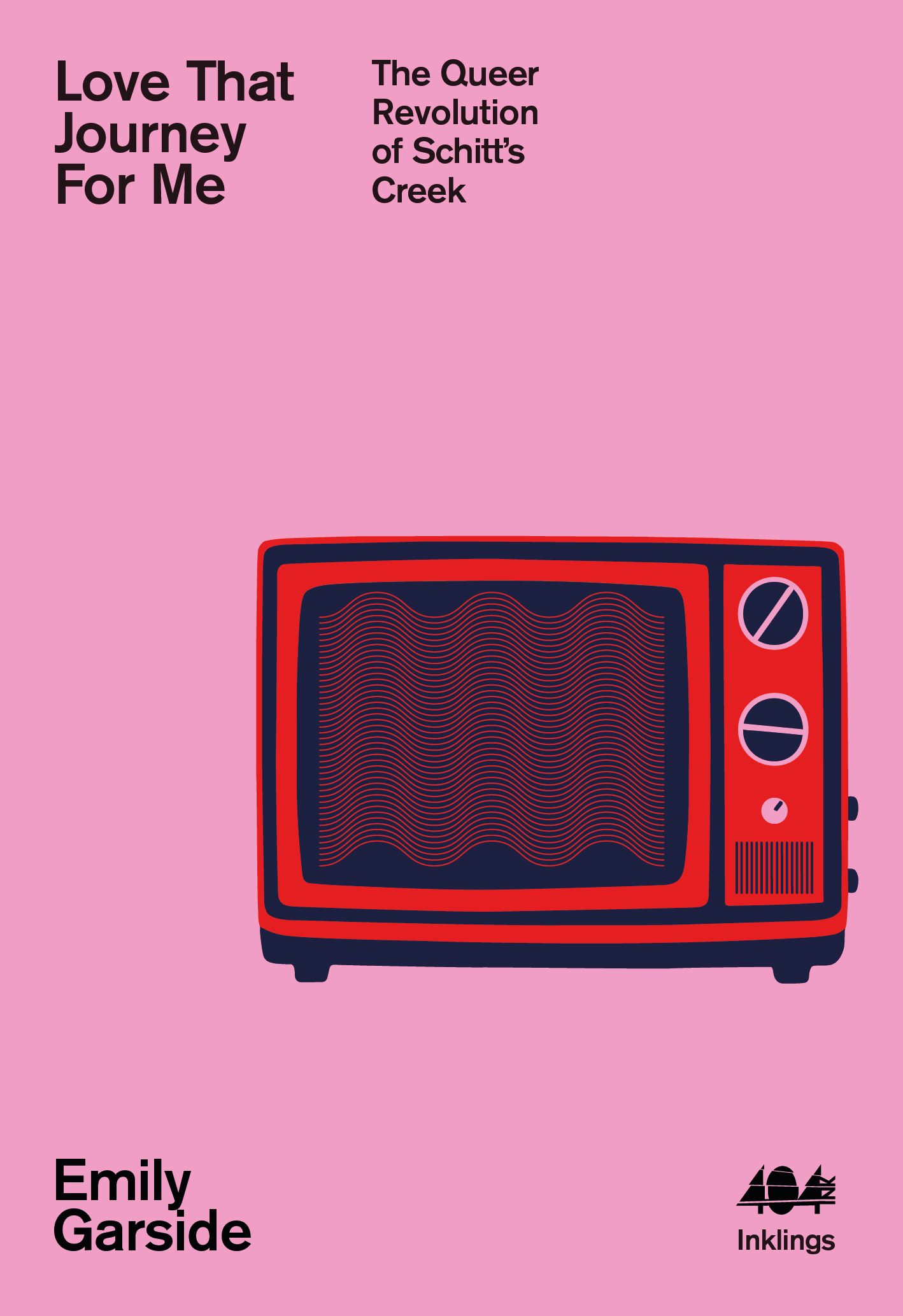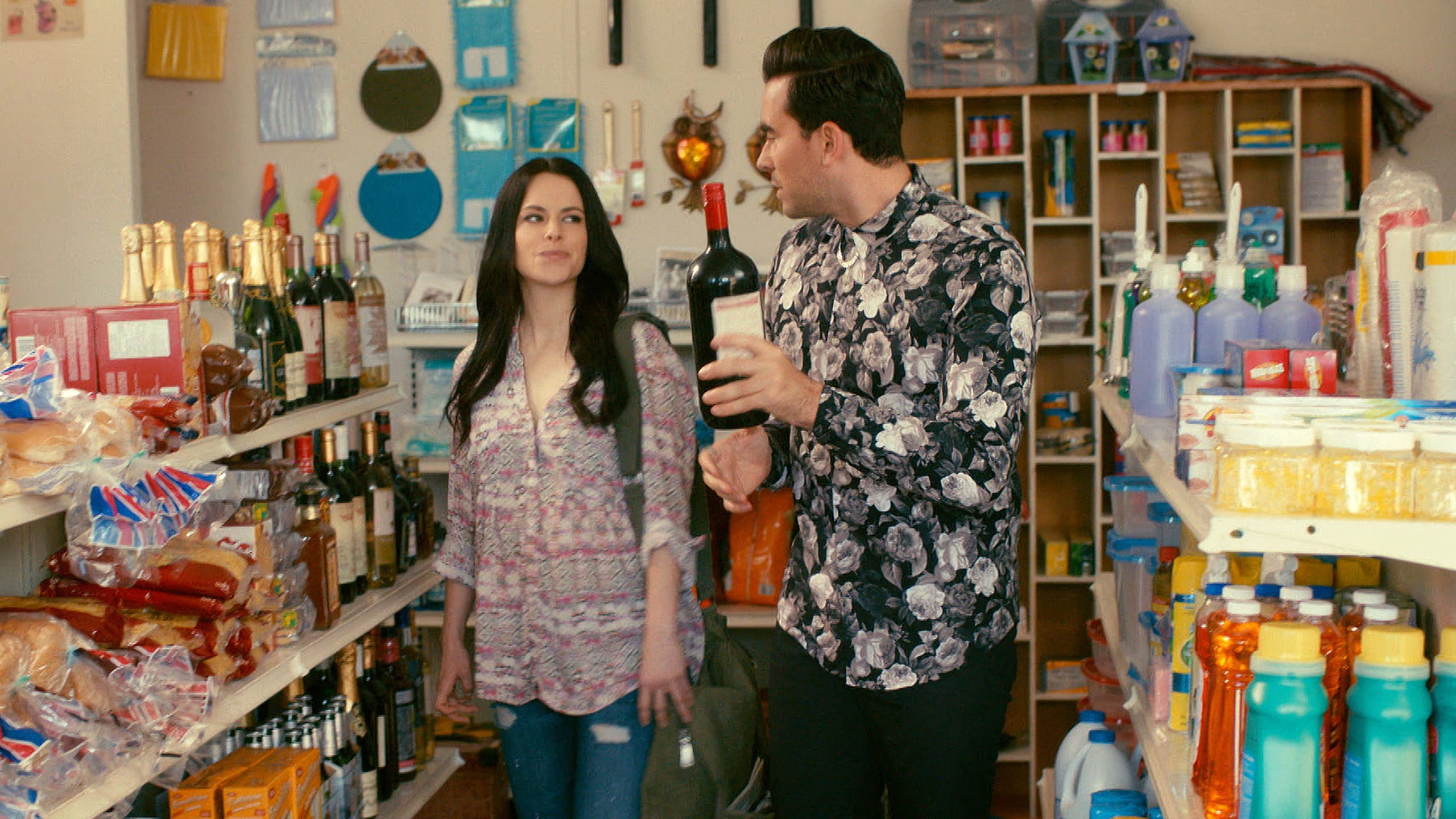In her new book, Love that Journey for Me: The Queer Revolution of Schitt’s Creek, Emily Garside writes that the eponymous fictional town is the world that the show’s co-creator and co-star Dan Levy wants to live in. “The idea is simple: What if these characters were able to exist somewhere free from the wider prejudices of the world?” Garside writes. “For queer viewers, it’s a chance to see their stories told as normal stories, which—we already know—they are, but these queer romantic narratives are so often filtered through the eyes of writers and characters with prejudice, those simply blind to a non-heteronormative relationship. More importantly, queer viewers get to see a happy, relatively carefree version of a gay love story, something rarely seen in cultural portrayals.”
That’s true not only of the gay romance between David (played by Levy) and Patrick (Noah Reid) but of desires and relationships that fit less easily into non-heteronormative relationship models.
In this excerpt from the book, Garside writes about how David’s easygoing speech describing his pansexuality to Stevie (Emily Hampshire) explains the sexual identity with enough wit and humour to disarm even the most skeptical viewer.
David Rose’s pansexuality is explored in several ways across the show. Johnny refers to the “college years,” Moira reiterates “it’s not a phase.” David will casually refer to partners of all genders, and his boyfriend will talk about his “colourful” dating history. But it’s the now famous “wine, not the label” speech that stands out.
While shopping for dinner party supplies, Stevie asks about David’s sexual orientation in a nonjudgmental way, using wine preferences as a metaphor; a valid enough question having just had sex with David, previously assuming he was gay. The conversation deserves a full quotation in all its glory:
David: I do drink red wine, but I also drink white wine. And I’ve also been known to sample the occasional rosé. And a couple summers back I tried a Merlot that used to be a Chardonnay, which got a bit complicated.
Stevie: So yeah, you’re just really open to all wines.
David: I like the wine and not the label. Does that make sense?
Stevie immediately accepts his answer. The “wine, not the label” speech has become iconic for many reasons, in all that it symbolizes: an out, pansexual character who is unapologetic, and not judged for it. David’s way of framing the description is brilliant in its directness, but also descriptiveness.
The neat summary, “I like the wine and not the label,” has understandably been adopted by queer people of all “labels” because it neatly fits any number of sexual and gender expressions. It’s also a lovely update of something from an iconic queer text, Evelyn Waugh’s Brideshead Revisited, a story centred on complex questions of sexuality, relationships and identity. A number of wine metaphors run throughout, with Anthony Blanche saying, “I know your tastes,” while ordering wine for Charles Ryder, whose sexuality is ambiguous across the novel.
Although David never refers to himself with a label, it’s of note that his dad does. Despite the emphasis on “the wine and not the label,” it’s significant that Johnny names David as pansexual because queer identities other than gay or lesbian are so rarely talked about on television. There’s power in naming them to the audience, both in seeing a diversity of queer identities presented unproblematically and that David is consistently pansexual across the show, and not just as a poor taste gag or plot point.
Jake is another sexually fluid character, though never explicitly labelled. He is “everybody’s ex and nobody’s ex.” While presented in an often-comedic way, he represents a lot of the preconceptions: that sexual fluidity and non-monogamy, or sexual promiscuity, are synonymous. Here, both Jake and David’s take on sexual fluidity are valid and, most importantly, neither are “conveniently” bisexual or pansexual for a storyline and then forgotten about. Their labels are both important and arbitrary. What matters is they’re allowed to express themselves sexually and romantically, without judgment.
Clearly little has changed in the three years since Jake and David’s first encounter, when he and Patrick accept his invitation for a “whisky” (the alcohol metaphors persevere). Meanwhile for David, he consistently mentions exes of various genders—or without reference to gender—across the series. One particularly lovely touch in reminding the audience of his pansexuality is during their tour of a wedding venue in series six, when he mentions an ex-girlfriend. It’s a small thing, but it stands out; in marrying Patrick, he isn’t erasing his pansexual identity, there isn’t a refusal to acknowledge his exes of different genders. David’s past is treated with equal weight as Patrick’s. Somewhat comedically, David says, “We’ve all been with a handful of other girls” to Patrick when he tries to defend the fact he hasn’t “just” been with David. That they’ve both been with women in their past isn’t used to erase their sexuality—Patrick views himself as gay, and David’s sexuality remains unchanged even as he makes a commitment to another man.
This distinction is important. Patrick’s sexuality is altered by his relationship with David—at least in the way he understands it, talks about it and labels it for himself. The show could have left it open-ended, that Patrick falls for David, while having dated women in the past. But they make a very clear distinction that same-sex relationships are what feel “right” to him, and that he labels himself as gay in coming out—as does David when talking about him, which indicates it’s a discussion they’ve had off-screen.
Meanwhile, David could fall into the classic category of pan/bisexual people being labelled in relation to the relationship they’re currently in. David doesn’t become “gay” because he’s in a long-term relationship with a man. His marriage to Patrick doesn’t erase his attraction to all other genders. In terms of representation for bi/pan people, that is of monumental importance.

This excerpt from Love that Journey for Me: The Queer Revolution of Schitt’s Creek is reprinted with permission.


 Why you can trust Xtra
Why you can trust Xtra


